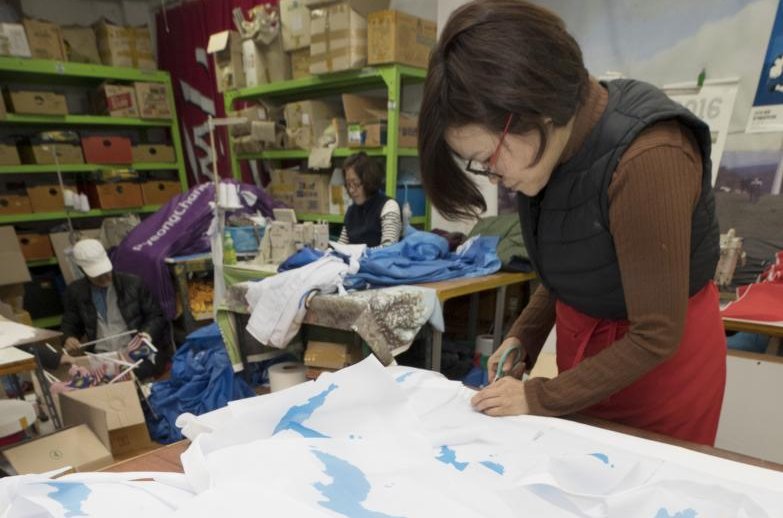A worker in Seoul, South Korea, makes Korean unification flags, which depict a blue silhouette of the Korean Peninsula on a white background, at a sponsoring company of next month's Pyeongchang Winter Olympics. Photo by Yonhap
Jan. 24 (UPI) -- Over the past few weeks, news from the Korean peninsula took a sharp turn from the "nuclear option" to the "Olympic option."
As if someone in Pyongyang suddenly woke up and smelled the kimchi, the North began getting involved in what had been until quite recently basically a South-only event. The North will send 22 athletes to participate, who will march with the South under a flag with the outline of the united Korean territory. It will send an orchestra of 140 musicians. North Korean hockey players will join the existing South Korean team, to create a single "all Korea" team. Naturally, government figures, artists and other influential persons are going to attend.
Some see this as a co-opting of the 2018 Pyeongchang Olympics by the North, a last-minute insistence on sharing credit for what was almost solely the work of the South. Whether or not that is true, however, there is reason to welcome the new developments.
Historian and NGO leader Hyun Jin Preston Moon postulated a new view of Korean nationhood in his 2014 book Korean Dream. Critiquing the failures of both North and South, he calls for a unified Korean nation based on several core principles.
The process of nationhood must come from the aspirations of the Korean people, he argues, and it must be Korean-led. "The Korean people must take control of and shape our own national destiny," he wrote, "through the unification process and lead our neighbors and the international community to support our efforts."
In this light, the recent rapprochement around the Olympics is a step in building consensus and identity as Koreans first, and giving voice to the people's desires. To walk under one flag expresses a shared sense of nationality. Instead of "us and them," the pronoun becomes "we" -- a powerful linguistic shift.
Moon's second key point is that to create a healthy and vibrant nation, Koreans must revive the ancient and enduring values of their 5,000-year shared history. Unlike the systems imposed on the people in the past century (colonial rule by Japan; the communist dictatorship fostered by Russia and China; capitalism and Western-style democracy implanted by the United States), Koreans maintained a unique culture of strong extended families and an emphasis on ethical leadership. Throughout Korean history, great leaders operated by the precept of "Hongik Ingan," which basically meant "benefiting the entire world."
The resolution of the Korean division does not merely affect Koreans, but all of us. Freedom, peace and prosperity throughout the peninsula automatically means stability and security for other nations, as well. A peaceful Korea benefits the entire world.
Seen from the perspective of human rights -- and the safety and health of the 29 million people of the North -- the Olympics is a unique portal. Every single person from the North who participates will be having experiences, gathering impressions and coming to certain conclusions. South Korea is highly developed, and the average resident lives a life unimaginable even to the uppermost echelons of the North. The economy is roughly 100 times the economy of the North. Every person has access to technology, information, education and travel. The smartphone that every South Korean carries, the food they eat, the way they live -- cannot go unnoticed by the visitors.
Human beings are intelligent and seek to improve their conditions. No political or economic system can long survive when compared to something that just works better.
North Koreans are not robots. They are flesh-and-blood people, and they have suffered through 70 years of policies that have not benefited them. Their participation in the Olympics, their inclusion in ceremonies, the recognition that may come -- takes away from no one, and it may just open a door for a different dynamic to emerge.
While politics may skew the decisions of team makeup or flag design, I would argue that there is a more compelling purpose to the Olympics than gaining medals. The founder of the modern Olympics, Pierre de Coubertin, wished to promote peace and unity through the medium of sports, bringing members of the international community -- especially political enemies -- together. From that viewpoint, it would seem that the 2018 Games are right on point.
Kate Tsubata is a freelance writer, filmmaker and advocate for human development. Since 2012, she has worked on various projects initiated by Hyun Jin P. Moon. Moon serves as chairman of the ultimate shareholder of UPI.















